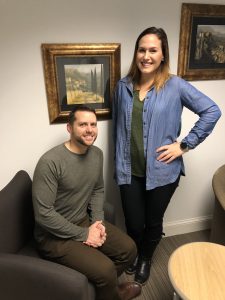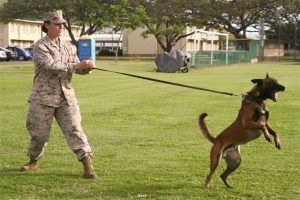Members of the Syracuse University community join forces on a new project from Teaching and Leadership professor Benjamin Dotger that gives student veterans an opportunity to talk openly about their nontraditional experiences and challenges on campus.
 Student veterans Katherine Quartaro and Daniel Cordial say they were both “simply curious” when they first read about a call for volunteers to participate in the VET-SIM pilot study. VET-SIM is a series of simulations designed to support veterans as they transition from military service to collegiate study. A collaboration between the School of Education, the Institute for Veterans and Military Families, and the Office for Veterans and Military Affairs at Syracuse University along with SUNY Upstate Medical University’s Clinical Skills Center, this is the most recent clinical simulation initiative from Professor Benjamin Dotger.
Student veterans Katherine Quartaro and Daniel Cordial say they were both “simply curious” when they first read about a call for volunteers to participate in the VET-SIM pilot study. VET-SIM is a series of simulations designed to support veterans as they transition from military service to collegiate study. A collaboration between the School of Education, the Institute for Veterans and Military Families, and the Office for Veterans and Military Affairs at Syracuse University along with SUNY Upstate Medical University’s Clinical Skills Center, this is the most recent clinical simulation initiative from Professor Benjamin Dotger.
Dotger, who has been using simulations for over a decade, finds it to be an effective way to prepare pre-service teachers and educational leaders. “Simulations represent deliberate, experiential learning that centers on meaningful problems, situations, and contexts, emphasizing knowledge and skills that transfer from pre-service preparation to in-service practice.” While the VET-SIM model is currently in the initial stages, Dotger says this project has the potential to be groundbreaking, and presents a potential “game-changing opportunity for higher education to develop better tools to support veterans’ transition to campuses across the country and prepare the future professoriate and student affairs cadre on leading practices supporting student veteran success.”
It is estimated that by 2025 more than 50% of the student population will be nontraditional students. Student veterans fall into that nontraditional category; they are likely to be older, married, have children, and working full or part-time jobs. Studies show that anxiety, fear, and loneliness are challenges traditional students may face transitioning into or during their higher education career. Student veterans may experience these same challenges, however, unlike their civilian counterparts, they may also face additional difficulties—including financial burdens (such as expiration of GI Bill benefits) or family obligations—that can affect their collegiate success. Further, some student veterans may face additional challenges to include health and wellness or a service-connected disability.
The VET-SIM project, to address these additional nontraditional barriers and challenges, is a tool designed to help the student veteran through issues by helping them navigate these nontraditional challenges they may face in higher education. The VET-SIM model hinges on two learning experiences: the simulated one-to-one interaction and a follow-up group debriefing. For the simulation, student veterans are paired with trained actors for the one-to-one exchange in a simulation room at the Clinical Skills Center. The conversations, driven by the actors, are around a simulated theme. These one-to-one sessions are videotaped and each student reviews the exchange. The second part of the VET-SIM involves a debriefing a week after the simulation, where student veterans are asked to come together to discuss their experiences. The debriefing process intentionally makes space for the group to engage as a community and allows each student the option of sharing his or her videotaped simulation. For those who agree, the group then collectively examines the video and discusses approaches, practices, strengths, and struggles.
Quartaro and Cordial say that while they liked the simulation portion of the VET-SIM model, they enjoyed the group discussions even more. Quartaro adds, however, that she was surprised by how short the simulations were, but amazed by how much time was spent discussing and really digging into how experiences in classrooms and on campus affect veterans. The discussions, says Quartaro, were the most meaningful part of the experience.
While the VET-SIM discussions were at times difficult, both Quartaro and Cordial say that doing something hard is not a bad thing. Says Quartaro, “even if the student veteran is brand new and hasn’t had any time in the classroom or on a campus, it would be very beneficial for them to be exposed to potentially uncomfortable situations and challenging experiences.”
 Quartaro, a senior in psychology and forensic science, also believes that by “facing these situations in simulations student veterans can be prepared, have discussions with others, and know that while it might not always be easy to face, they are not alone.”
Quartaro, a senior in psychology and forensic science, also believes that by “facing these situations in simulations student veterans can be prepared, have discussions with others, and know that while it might not always be easy to face, they are not alone.”
Cordial likewise says he felt that VET-SIM was overall successful and added that the experience “allowed a small population of veterans to voice concerns they may have had with transitioning into academic life.” Cordial completed his undergraduate degree from Syracuse University in May and is currently pursuing his master’s degree.
Additionally, both Quartaro and Cordial say that while they experienced personal struggles transitioning on campus, the overwhelming support of fellow student veterans and the Syracuse University community helped them heal and be successful academically. Cordial adds “it is because of the people here and the experiences I have had, that I feel like I am in the right place, doing the right things. I am, now, happily involved in assisting other student veterans as they transition into higher education, and I look forward to more academic opportunities and exciting things within the veteran and military space here at Syracuse.”
Now that the pilot is complete, due in part to the support from SOE alumna and Board of Visitors member Laurie Wolfert, and her husband, David, the next step involves the design and implementation of a full VET-SIM model with a second cohort of student veterans transitioning to Syracuse University. With the right resources, this next phase will have a longer-term goal of offering VET-SIMs to all incoming student veterans at the initial stage of their collegiate experience.
Cordial adds that while the project helps the student veteran, he also believes it could have a broader impact and has the potential to help the Syracuse community as well. “It gives the University an opportunity to see, hear, and understand what is good and what needs to be improved upon so future veterans have a more pleasurable transition experience.” While most student veterans believe their military skills and leadership contribute positively to an educational setting, many believe the college or universities they attend do not recognize the value of these specific attributes. Cordial says he believes that the more student veterans that participate in this, the better the veteran community will be as a whole. “If one person is having challenges, so are others—and that needs to be addressed. This program is a good way to hear what those bad experiences are and a good way to find solutions.”
About SIMS: In Partnership with SUNY Upstate Medical University’s Clinical Skills Center, each simulation is captured on video, allowing teachers and leaders to carefully analyze how they approached the problem or issue presented by the standardized individual during the simulation. Clinical simulations are demanding, intense opportunities of situated practice, where the teacher or school leader participant is challenged to enact their professional skills, knowledge, and decision-making capabilities to address a complex problem-of-practice.
Syracuse University’s enduring commitment to veteran and military-connected students dates back more than 100 years. Leading the charge are the Institute for Veterans and Military Families at Syracuse University and the Office for Veterans and Military Families.
